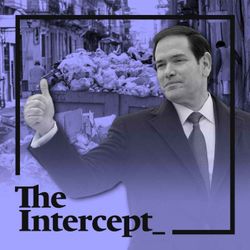Share

The Intercept Briefing
Azerbaijan War on Armenians in Nagorno-Karabakh Forcibly Displaced Tens of Thousands
Nearly the entire population of 120,000 ethnic Armenians in Nagorno-Karabakh has been forced to flee their homes after the latest Azerbaijani military assault, according to Armenian authorities and the U.N. This week on Intercepted, Maria Titizian, editor-in-chief of EVN Report, joins Jeremy Scahill and Murtaza Hussain to discuss the history leading up to the recent Azerbaijani offensive and mass exodus of civilians, the collapse of the Republic of Artsakh, and the emerging geopolitical alliances exploiting the protracted humanitarian crisis.
If you’d like to support our work, go to theintercept.com/give, where your donation, no matter what the amount, makes a real difference.
And if you haven’t already, please subscribe to the show so you can hear it every week. And please go and leave us a rating or a review — it helps people find the show. If you want to give us additional feedback, email us at Podcasts@theintercept.com.
More episodes
View all episodes

9. Rambling Man: Trump’s State of the Union
37:54||Season 3, Ep. 9“The deliberate cruelty that they found humor in stood out to me,” says Jordan Uhl of Donald Trump’s Tuesday evening State of the Union. This week on the Intercept Briefing, co-hosts Uhl, Akela Lacy, and Jessica Washington disentangle Trump’s nearly two-hour-long speech so you don’t have to. “This is who these people are. In some ways, they're trying to sugarcoat what they're doing, but in other ways they're so blatant about doing really evil things around the world and being totally OK with it,” says Lacy, in reference to Trump talking about kidnapping Venezuelan President Nicolás Maduro. “It is really alarming to me how good they are at framing that in a positive light. And there were people cheering all over the room for us toppling a regime, doing regime change, while they're telling you that we don't do that anymore.” Washington adds, “The whole thing, if you read it, if you listen to it, it reads like a white nationalist speech.”The co-hosts also dissect the Democratic Party's official response to the State of the Union, delivered by Virginia Gov. Abigail Spanberger.Listen to the full conversation of The Intercept Briefing on Apple Podcasts, Spotify, or wherever you listen. Keep our investigations free and fearless at theintercept.com/join.
8. What Does the Trump Administration Want With Cuba?
58:56||Season 3, Ep. 8Cuba is spiraling into a humanitarian crisis. The country’s long-standing economic and political turmoil reached new heights this week as the effects of the Trump administration’s oil blockade took hold.The president’s targeting of Cuba is part of the administration’s broader attacks on the region, where the U.S. kidnapped Venezuelan President Nicolás Maduro and his wife Cilia Flores earlier this year and has executed more than 140 people in boat strikes.As the U.S. hurtles toward war with Iran and further military action in the Middle East and continues to fund Israel’s genocide in Gaza, Cuba is just the latest foreign policy arena where the Trump administration has further ensnared the U.S. This week on The Intercept Briefing, senior politics reporter Akela Lacy speaks with fellow reporter Jonah Valdez about how U.S. foreign policy is impacting the upcoming midterm elections and Valdez’s recent reporting on how a new anti-Zionist PAC has associated with influencers that have made statements that are outright antisemitic. Lacy also speaks to University of Miami history professor Michael Bustamante and Andrés Pertierra, a historian of Cuba specializing in post-1959 regime durability, about the crisis unfolding in Cuba.Missing from mainstream news coverage of Trump’s attacks on Cuba and U.S. efforts to impose regime change in the region is a recognition of how Trump’s policies fit into his attacks on immigrants in the U.S., Bustamante says.“One of the, I think, subtext of why this administration might be keen on government change in Cuba, like in Venezuela, it's not just about being able to plant the flag and say, ‘We buried communism in the Americas. Something that no other president could do,’” Bustamante says. “It's also about, we can deport more people. And we can deport more people. And so how does the Cuban American community react to that? That, I think, is an open question. Something that I haven't seen linked yet to the conversation about regime change, per se.”The Trump administration’s strategy is likely to backfire, Pertierra says.“You don't get long-term cooperation stability through fear,” he says. “So I don't think it's actually going to solidify the U.S. position in Latin America. I think it's going to further weaken it.”Listen to the full conversation of The Intercept Briefing on Apple Podcasts, Spotify, or wherever you listen. Keep our investigations free and fearless at theintercept.com/join.
The Intercept Briefing Trailer
00:58|Cut through the noise with The Intercept’s reporters as they tackle the most urgent issues of the moment. The Briefing is a weekly podcast delivering incisive political analysis and deep investigative reporting, hosted by The Intercept’s journalists and contributors including Jessica Washington, Akela Lacy, and Jordan Uhl.
7. Attorney for Epstein Survivors Warns That Justice Is Impossible With Bondi as AG
34:18||Season 3, Ep. 7Attorney General Pam Bondi testified before the House Oversight Committee on Wednesday, defending the Justice Department’s widely criticized rollout of the Epstein files against accusations that her department is shielding powerful men, including President Donald Trump, at the expense of survivors. Democrats, who reviewed the unredacted files for the first time this week, revealed that the names of “wealthy, powerful men” were improperly redacted, while the names of victims were left exposed. This week on The Intercept Briefing, co-hosts Jessica Washington and Akela Lacy gave their rundown of the politics stories they’re watching right now. Washington also spoke with Spencer Kuvin, an attorney representing nine of Epstein’s victims, about the failures of the Department of Justice to protect survivors. “From the beginning of this case, the government, both from a state and federal level, have been trying to bury this, cover it up, and avoid any full exposure of the extent of the operation that was involved here,” Kuvin said, “and they're doing it … because of all the both political, wealthy, and powerful individuals who were involved with Epstein and knew what was going on with these young women.” Kuvin also spoke about the DOJ’s failure to redact the names of victims in the files, including two of his clients who were victimized as children. “The current Department of Justice has a focus on something different than victims and helping victims and prosecuting bad people that victimize these young girls,” he said. “Their focus instead appears to be on the important people — powerful people that are contained within these files and protecting them instead of protecting who needs the protection, the young victims in this case.”Listen to the full conversation of The Intercept Briefing on Apple Podcasts, Spotify, or wherever you listen.
6. “Terrorist”: How ICE Weaponized 9/11’s Scarlet Letter
38:50||Season 3, Ep. 6The word “terrorist” wasn’t coined on September 11, 2001, but the defining event of the early 21st century ushered it in as the United States’ go-to term for demonizing outsiders and dissenters alike. The so-called “war on terror” transformed the way the U.S. wields power at home and abroad, enabling mass surveillance and a crackdown on the right to free speech. It became reflexive for the U.S. to disparage immigrants and protesters as supporters of terrorism.President Donald Trump has embraced this model and manipulated it for his own ends, as author Spencer Ackerman points out. The Trump administration often peddles spurious accusations of terrorism against the targets of its immigration raids.“There's nothing about any of their action that's remotely anything at all like terrorism,” Ackerman says. “But that is the fire in which ICE, CBP, and the Department of Homeland Security was forged. You are going to find this in its DNA.”This week on the Intercept Briefing, host Jordan Uhl speaks with Ackerman, a leading expert on the concept of terrorism and its weaponization by the state. Ackerman’s 2021 book, “Reign of Terror, How the 9/11 Era Destabilized America and Produced Trump,” traces the legal and cultural evolution of the last 25 years, and how the boomerang has come back home.“Before 9/11, not only was there no ICE, there wasn't really much in the way of a robust internal mechanism for finding and deporting people who were in the country illegally. When it did exist, it was for people who were serious criminals, traffickers, and so on,” says Ackerman. Now, he says, the contemporary terrorism paradigm has transformed immigration enforcement into something “operating like a death squad.”“What we are seeing on the streets of Minneapolis is what ICE has done to the undocumented for a very long time,” he says. “And now we're seeing this happen to white people on the streets of Minneapolis for little more than filming ICE.” With the recent killings of Renee Good and Alex Pretti, “I worry that a tremendous amount of our political system is geared toward either, on the Republican side, rationalizing it, justifying it, or on the Democratic side, pretending as if this is some kind of abuse that can be exceptionalized, rather than something that has to do with this 25-year history of coalescing immigration enforcement in the context of counterterrorism.”As Democrats in Congress struggle to leverage DHS funding for changes to ICE policy — like a ban on face masks for ICE agents, an idea on which they’ve already softened — Ackerman says the parallels with the early 2000s are clear.“We can't move in reformist directions when the thing talked about being reformed laughs at killing Americans,” advises Ackerman. “Reformist politics under two Democratic administrations got us to where we are now. These are accommodationist politics, and the thing being accommodated wants to kill you.”Listen to the full conversation of The Intercept Briefing on Apple Podcasts, Spotify, or wherever you listen. If you want to support our work, you can go to theintercept.com/join.
5. Even the Top Prosecutor in Minneapolis Doesn’t Know the Identity of the Agents Who Killed Alex Pretti
52:44||Season 3, Ep. 5In the two months Minnesota has been under siege by federal agents, immigration officers have shot and killed two U.S. citizens, poet and artist Renee Good and ICU nurse Alex Pretti. Local and state law enforcement say they’ve been blocked from properly investigating the shootings of Good and Pretti. “The federal government has blocked our state BCA, so that's the Bureau of Criminal Apprehension. They are the state law enforcement agency that has authority to investigate any kind of deadly use of force involving police,” says Hennepin County Attorney Mary Moriarty, who is leading local investigations into the killings of Good and Pretti. “We've not gotten anything from the federal government,” Moriarty says. “To tell you how odd this situation is, we are getting our information from the media ... we are not getting that from the federal government.” This week on The Intercept Briefing, host Akela Lacy speaks with Moriarty, whose office has jurisdiction over both killings. Moriarty says federal agents have blocked local and state law enforcement from properly investigating the killings. Even Moriarty, the top prosecutor in Minneapolis, does not know the identity of the agents who killed Pretti. In response, Moriarty says, “We set up a portal and asked the community to send any kind of videos or any other kind of evidence so that we could collect absolutely everything that we possibly could.” The BCA, she says, was even “blocked physically, actually, by federal agents from processing the scene where Alex Pretti was shot.”Meanwhile, attacks by the administration on Minnesota’s Somali citizens persist. At her first town hall of the year in Minneapolis, an attendee sprayed Rep. Ilhan Omar with an unidentified substance on Tuesday. Trump has backtracked on some of his bluster and removed Border Patrol Gregory Bovino from Minnesota, replacing him with border czar Tom Homan. None of that has changed things on the ground yet in Minneapolis, says Moriarty. “Minnesotans care about their neighbors. They're delivering meals to people. They are there and they do not approve of the fact that their federal government is attacking them and their neighbors.“We hear a lot of people talking to us about how they understand the threat from the administration or from DHS on their neighbors and on their communities, and it's really much more rooted in an understanding that they think their freedoms are under threat, even if they are not an immigrant or even if they don't really have deep ties to immigrant communities, that this really matters to them and it really bothers them,” says Jill Garvey, co-director of States at the Core, an organization that leads and runs ICE Watch training programs. “So we hear a lot from folks who just haven't been engaged previously. But this for all those reasons is enough for them to step up.”Garvey says her organization is training community members in how to properly document ICE. “We also know that we can't stop all this aggression,” Garvey says. “The aggression is the point of these operations. So we can't guarantee that people aren't going to be targeted with violent actions from federal law enforcement. What we can say is, if you're doing this in community, other people are going to be watching.”Listen to the full conversation of The Intercept Briefing on Apple Podcasts, Spotify, or wherever you listen. If you want to support our work, you can go to theintercept.com/join.
4. Protests and Power Plays: From Tehran to the Arctic Circle
49:20||Season 3, Ep. 4The people of Iran are in the midst of one of the country’s biggest uprisings — and harshest government crackdowns — since the Iranian Revolution. It started with shopkeepers in bazaars closing their doors at the end of December in protest of the plummeting Iranian rial and economic distress. But demonstrations soon spread to universities and across the country to every single province. Working-class Iranians wanted relief — both from the inflation crisis and U.S sanctions.This week on The Intercept Briefing, host Akela Lacy speaks with Hooman Majd, an Iranian American writer and journalist, who explains what sparked the protests and the government’s brutal response. “I don't think in the history of Iran, even during the Islamic Revolution, have we seen this number of fatalities.” says Majd. “The death toll is staggering. Really, because that death toll is staggering, what's happened is there are no more protests. And that's where we are right now. No more protest, heavy security on the streets. Massive security on the streets, on every corner. It isn't martial law. But it feels like martial law to people living there.”The path forward is unclear, Majd says. But a few things are certain. “The idea is no to shah, no to an ayatollah, no to theocracy. Let's just, finally, after 120 years of demonstrating — which is what the Iranians have been doing since 1906 — after 120 years of looking for democracy, can we just do that? Can we just get a democracy? That is probably the biggest sentiment in Iran: wanting a democratic rule, wanting the repression to end, wanting better relations with the rest of the world so these sanctions can be lifted.”Some people inside and outside Iran have called on President Donald Trump to intervene. The idea that the U.S. should — or could — impose regime change militarily is folly, Majd says. “Sure, we were able to impose a regime change in Iraq militarily. They can do that again in Iran, possibly with the help of Israel or even without the help of Israel. But then what do you have? Do you have another basically authoritarian, autocratic government?’” Meanwhile, Trump has threatened to intervene in another international arena. He has set his sights on taking over Greenland. Despite walking back his statements pledging to do so by force, Trump has now said he’s forming a plan with the secretary general of NATO for Greenland’s future. We’re joined by independent investigative journalist Lois Parshley, who explains the financial interests behind Trump’s obsession with the Arctic island, the billionaires and tech moguls plotting to exploit Greenland’s natural resources, and how the people of Greenland have responded to the president’s pledge to violate their sovereignty.Shortly before Trump first expressed an interest in Greenland during his first term, his ambassador to Denmark and Greenland visited a major rare earth mining project on the island, Parshley reported last year. “More recently, The Guardian reported that it was Ronald Lauder, heir to the global cosmetics brand [Estée Lauder] who was also a longtime friend of Trump's, who first suggested buying Greenland. He has acquired commercial holdings there and is also part of a consortium who want to access Ukrainian minerals.”Fresh off the invasion of Venezuela, the idea that Trump wants to take over Greenland is even more alarming, Parshley says. “I'm not the first person to report on these kinds of major tech interests in things like crypto states or special economic zones. People have been pointing this stuff out for a long time, but it's not until President Trump started saying the quiet part out loud that people have really been registering some of these absurd concepts that seem to now be creeping toward reality.”Listen to the full conversation of The Intercept Briefing on Apple Podcasts, Spotify, or wherever you listen. If you want to support our work, you can go to theintercept.com/join.
3. Trump’s War on America
59:51||Season 3, Ep. 3Immigration and Customs Enforcement agent Jonathan Ross fatally shot Renee Good, a 37-year-old mother of three, in Minneapolis last week, unleashing a wave of anti-ICE protests and sentiment throughout Minnesota and the rest of the United States. On Wednesday evening, federal immigration agents shot and wounded a man in Minneapolis, adding to the tension in the Twin Cities. President Donald Trump threatened to send in troops to crush the unrest.“What should be very clear to all Americans now is that there is no way to wage war on ‘illegal immigration’ without also waging war on American citizens,” says Adam Serwer, staff writer at The Atlantic.This week on The Intercept Briefing, host Jessica Washington examines how the Trump administration’s brutal deportation agenda is unfolding in Minnesota, sparking national backlash and renewed demands to abolish ICE; the historical legacy of immigration enforcement in the U.S.; and the administration’s racist vision of reshaping American society. First, Minnesota Public Radio reporter Jon Collins shares an update on the Trump administration’s siege. “The national audience needs to understand this is not just unrest, this is not just protests. … This is an invasion,” says Collins. “The justification from this administration, the way that they’re portraying what's happening here in Minnesota — it almost turns on its head how we think about our constitutional rights in this country. Instead of protecting the citizens from the government, what they're arguing for is protecting law enforcement from any transparency, from any accountability to the people.”“The biggest organization of terror in this moment is the Department of Homeland Security,” says Rep. Delia Ramirez, who shared exclusively with The Intercept that she is introducing legislation to limit the use of force by DHS agents.The Illinois congresswoman described the bill as the “bare minimum” to curb DHS’s abuses, calling for Democrats to use the appropriations process to “hold” funding to the agency and ultimately dismantle it. “Every single Democrat and every single Republican should be able to sign on to this bill,” says Ramirez. “Because it’s basic, bare minimum, and not signing on is indicating that you're OK with what's happening on the streets.” “What we're seeing today has a long history,” says Adam Goodman, a historian at the University of Illinois Chicago. Federal immigration agencies’ budgets depend “on apprehensions, detentions, and deportations.” That “institutional imperative,” he says, “is going to lead to all kinds of problems, including incredible discretionary authority … and tremendous abuses.”Serwer points out “the violence that you're seeing that federal agents are engaging in against observers, against activists, not just against immigrants, is a reflection of [an] ideological worldview. Which is that those of us who do not agree with Donald Trump are not real Americans and are not entitled to the rights that are due us in the Constitution, whether or not we have citizenship.” He adds, “The truth is, a democracy cannot exist when it has an armed uniformed federal agency who believes that its job is to brutalize 50 percent of the country.” Listen to the full conversation of The Intercept Briefing on Apple Podcasts, Spotify, or wherever you listen. If you want to support our work, you can go to theintercept.com/join.
2. Greg Grandin on Trump’s “Universal Police Warrant”
37:50||Season 3, Ep. 2How long will the United States claim control over Venezuela? “Only time will tell,” President Donald Trump told the New York Times on Wednesday — potentially years. U.S. troops invaded the country over the weekend, kidnapping President Nicolás Maduro and his wife, Cilia Flores. Maduro and Flores pleaded not guilty to narco-terrorism charges in New York on Monday. They now sit in a Brooklyn jail, awaiting trial. Trump and administration officials have justified ousting Maduro by claiming it was consistent with the Monroe Doctrine — a doctrine that through the years “has been expanded into something like a universal police warrant that allows the United States to intervene,” says historian Greg Grandin. “Trump has redefined the Monroe Doctrine to mean, the Monroe is as a weapon that the United States can use in order to protect its interests wherever it wants, whenever it wants. So it's a substitute for liberal international law.” This week on the Intercept Briefing, host Jessica Washington discusses the Trump administration’s attack on Venezuela, its larger aims of controlling the Western Hemisphere, and bringing Latin America to heel with Grandin, the author of numerous books, including most recently "America, América: A New History of the New World."“There's an affiliation between the Monroe Doctrine and American First nationalism,” says Grandin. “They imagine United States sovereignty expanding well beyond its borders within its hemisphere.” The administration’s vision is outlined in the National Security Strategy the White House released in December. “This is a strategy that announces that the Monroe Doctrine is back in the especially bellicose form. But what's also interesting, if you read further, the United States is not withdrawing from any of those old regions. … It's reserving the right to treat the rest of the world like it treats Latin America.” Trump and administration officials — from Secretary of State Marco Rubio, a longtime advocate for Venezuelan and Cuban regime change, to White House chief of staff Stephen Miller — have threatened to expand military operations to Colombia, Mexico, and other Latin American countries that don’t fall in line. Maureen Tkacik, investigations editor at The American Prospect, who recently wrote a profile of Rubio headlined “The Narco-Terrorist Elite,” also joins the conversation to discuss the former Florida senator’s history and ambitions.Tkacik points out that Rubio, a driving force behind Maduro’s ouster, represents a wing of the Republican Party fixated on battling nominally left leaders in the region. That mentality is at odds with a key faction of Trump’s base, who say they’re against foreign intervention because they think the government should keep its attention on U.S. soil.Trump’s attack on Venezuela and fixation on so-called “narco-terrorists,” Tkacik says, “represent an attempt to reconcile these two poles — the Steve Bannon guys and the Marco Rubio neocons — that really have different definitions of America First.”Listen to the full conversation of The Intercept Briefing on Apple Podcasts, Spotify, or wherever you listen. If you want to support our work, you can go to theintercept.com/join.